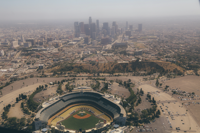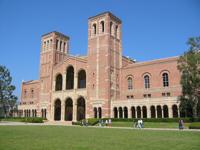
The Dodger Stadium stands on top of what once was Bishop, La Loma and Palo Verde. Photo by Joel Muniz
Last Monday, September 30, was the last day that Governor Gavin Newsom either signed into law or vetoed numerous bills passed by the state legislature.
With 34 days away from the 2024 Presidential Election Day, Newsom made decisions on many bills that touched on things like artificial intelligence, healthcare, farmworkers,homeownership and warehouse development, among other things.
Many of the bills on his desk were reparation-related bills, like Assembly Bill 1950, also known as the Chavez Ravine Accountability Act. AB 1950 was one of the many bills that were vetoed by the Democratic governor.
If signed into law, the bill would have created a state-level task force to address the historical injustice that forced hundreds of families and descendants of La Loma, Palo Verde and Bishop, commonly known as Chavez Ravine, out of their homes in the 1950s and 1960s. The land where the three communities were once located is where the Dodger Stadium sits today.
The bill, which was first introduced by Assemblywoman Wendy Carrillo, asked for a city task force to be created and mandated by the state, which was later changed in the California Senate negotiations to a state task force.
La Loma, Palo Verde and Bishop intertwined to form the 315-acre area, a valley a few miles northeast of downtown L.A. that housed more than 1,800 families. Despite the perspectives of outsiders and the City of Los Angeles officials, who often labeled the community as a “vacant shantytown,” or the “slums,” the three communities were fully autonomous, vibrant and cohesive, serving as a hub for homeownership and economic development and growth for people of color.
The tranquility of those who lived in these neighborhoods came to a halt when the Federal Housing Act of 1949 reduced housing costs, raised housing standards and granted money to cities from the federal government to “clear slums and rebuild blighted areas,” as stated in the act.
The City of L.A. would then condemn the community land through the power of eminent domain for the purpose of constructing a public housing project called Elysian Park Heights.
Shortly after that, residents received letters from the city informing them that, in order for the land to become available for the plan, they would need to sell their homes. They were also told that those displaced could live in the new housing.
In 1958, after the Elysian Park Heights housing project had unraveled, the city conveyed the Chavez Ravine land to a private entity for an insignificant amount considering the land’s value, and in June of that same year, a referendum was approved to trade the land to the then-Brooklyn Dodgers owner, Walter O’Malley. On May 9, 1959, remaining residents were forcibly evicted by sheriff deputies, their homes bulldozed..
“Chavez Ravine was wrongfully condemned land, and its residents were displaced and unjustly deprived of their constitutional right to own property,” the final version of the bill stated.
Newsom said that although he supported the intent to evaluate and address the injustice that took place in the Chavez Ravine community decades ago, he could not sign the bill. Newsom said that a task force should be established at the local level instead of at the state level and asked local leaders in the City of L.A. and L.A. County to determine and provide compensation to the displaced families.
“Fundamentally, the determination of recommendations for compensation to those displaced is an issue best addressed by stakeholders closest to the Chavez Ravine community. I encourage the author to work with local leaders to successfully meet the goal of providing equitable compensation to displaced residents,” he wrote in his veto statement. “For this reason, I cannot sign the bill.”
Carrillo, who currently represents the 52nd State Assembly District which is home to approximately 500,000 residents in the City of L.A. and south Glendale, also echoed some of Newsom's statements and asked for the city to begin to take action.
“Governor Newsom’s veto emphasized the need for local leaders to establish a task force for equitable compensation rather than tasking the state with the responsibility. Despite having over 60 years to address and apologize for this historical housing injustice in Chavez Ravine, the City of Los Angeles has yet to take action,” she told CALÒ News. “When local governments fail to act, the state must step in, which is what AB 1950 did. The original policy, as written, had a city task force that was later changed in Senate negotiations to a state task force.”
Buried Under the Blue, a nonprofit organization created by Melissa Arechiga, Jeannie Arechiga and Vincent Montalvo, who are descendants of the displaced families, said they are excited that a possible task force could soon be in the hands and responsibility of the L.A. County supervisors and L.A. city council members, like Councilwoman Eunisses Hernandez (CD-1), who oversees the neighborhood of Elysian Park, where the communities were once located.
“We have already talked to her and told us she will support us; we hope that remains true,” Montalvo said.
Buried Under the Blue said they knew the bill, as it read, was not going to be signed into law as it was missing many things, one of them being authentic accountability. For the organization, the bill is missing the names of the responsible parties and elected officials who, at the time, facilitated the removal of hundreds of families in the area.
Montalvo said the writing of the bill contains a lot of gray language. Throughout the bill’s text, the Dodgers are referred to as a “sports stadium and an entity.”
“None of the different versions of the bill ever mentioned the Dodgers or the elected officials who were at fault for what happened all those years ago,” Montalvo told CALÒ News. "There are people who have names and are directly responsible for the taking of the land and/ or who are currently benefiting from the displacement that happened in the 1950s.”
Buried Under the Blue believes the Dodgers should be involved in the reparations, since, according to them, the team continues to benefit from the land.
Montalvo also told CALÒ News that ever since the bill was first introduced to them, even the topic of reparations has been challenging to some of the members of Buried Under the Blue. “I could never in my mind take a dollar, a piece of land, knowing that I'm walking on someone else's back. Land back can only be claimed by the first lineal descendants of the territories, and we recognize the Kizh Nation and the Indigenous people of the land before the Palo Verde, La Loma and Bishop were ever built,” he said. “We were displaced but they have been displaced for over 500 years. They're the original sin of the city.”
Montalvo and Buried Under the Blue hope that issues around accountability and reparations are talked about with city and county leaders who will take on the vision of the bill in the future.
According to a recent story by LAist, Newsom voted one of every five bills on his desk. This year he vetoed 183 bills, a higher number of rejected bills than last year (156). When it comes to AB 1950 and other views that would help immigrants, such as AB 1840, Montalvo said the vetoing of these bills signifies the mixed political views of political leaders like Newsom. “We question whether the state-elected officials are actually progressive and if California [is] still leading these types of policies across the nation, and well, the vetoes say it all,” he said.
Although the bill was not signed into law, both Carillo and Montalvo are happy that the communities of La Loma, Palo Verde and Bishop were recognized at a state level and that there was something in text and writing that formally stated the state's and city's responsibility for the displacement of the families living in those communities.
Montalvo has heard the stories of La Loma, Palo Verde and Bishop since he was a kid. His grandmother, grandfather and mother were all born and raised in Palo Verde. He said his grandfather, before dying in November of 2023, expressed to him his happiness at seeing the injustice he and his family suffered finally being recognized at the state level.
“Even though the residents of those communities knew the wrong that happened from the first day that they got those letters of eviction or eminent domain notices, having people in government acknowledge the injustice was the most important part of the bill,” he said. “For the first time, people like my grandpa knew the injustices were not just part of their heads, that it was really as bad as they once remembered. Even though the bill was not all that we hoped for, they felt, even for a little [while], seen and affirmed.”
Montalvo said that although his grandfather died before seeing true reparations, he will continue to honor the values he instilled in him and continue to share the stories of La Loma, Palo Verde and Bishop.
Carillo said the journey toward justice is far from complete. “For some, the bill was too broad and for others, the bill didn’t do enough. Despite negotiations and ultimately the bill not being signed into law, it remains crucial to acknowledge and address the historical discriminatory housing practices of redlining faced by Latino and other vulnerable communities through material redress and public commemoration,” she said. “This bill was a step towards accountability—the first time the issue was heard in the California State Legislature and the first time many learned about this dark history.”











(0) comments
Welcome to the discussion.
Log In
Keep it Clean. Please avoid obscene, vulgar, lewd, racist or sexually-oriented language.
PLEASE TURN OFF YOUR CAPS LOCK.
Don't Threaten. Threats of harming another person will not be tolerated.
Be Truthful. Don't knowingly lie about anyone or anything.
Be Nice. No racism, sexism or any sort of -ism that is degrading to another person.
Be Proactive. Use the 'Report' link on each comment to let us know of abusive posts.
Share with Us. We'd love to hear eyewitness accounts, the history behind an article.